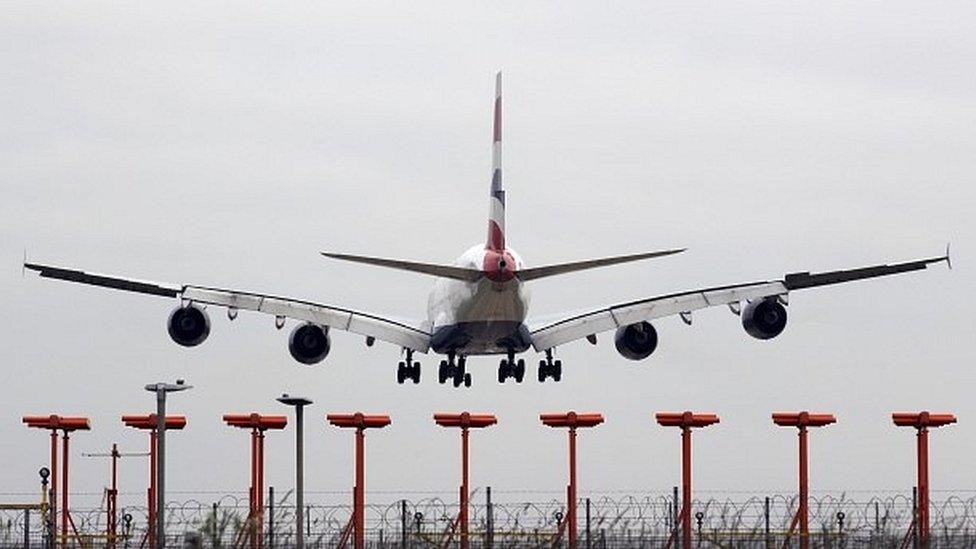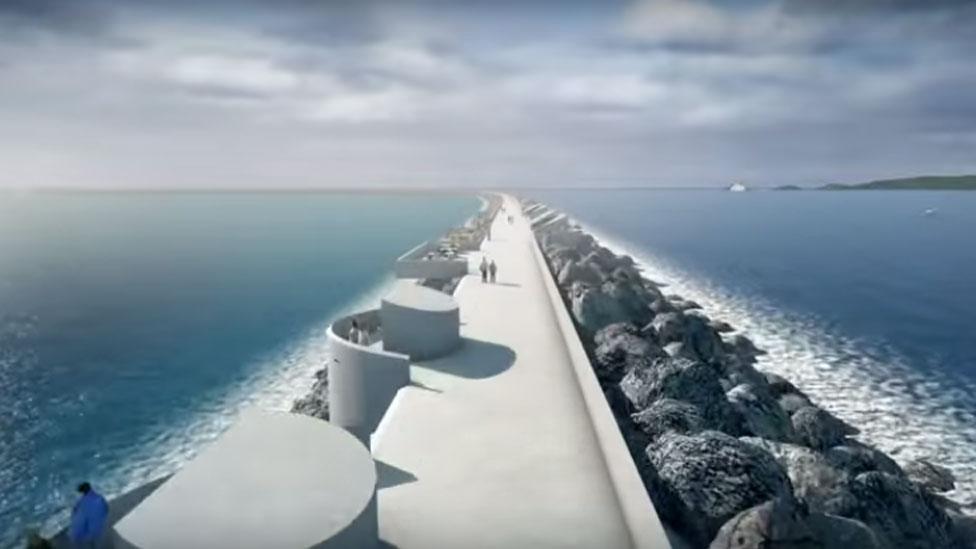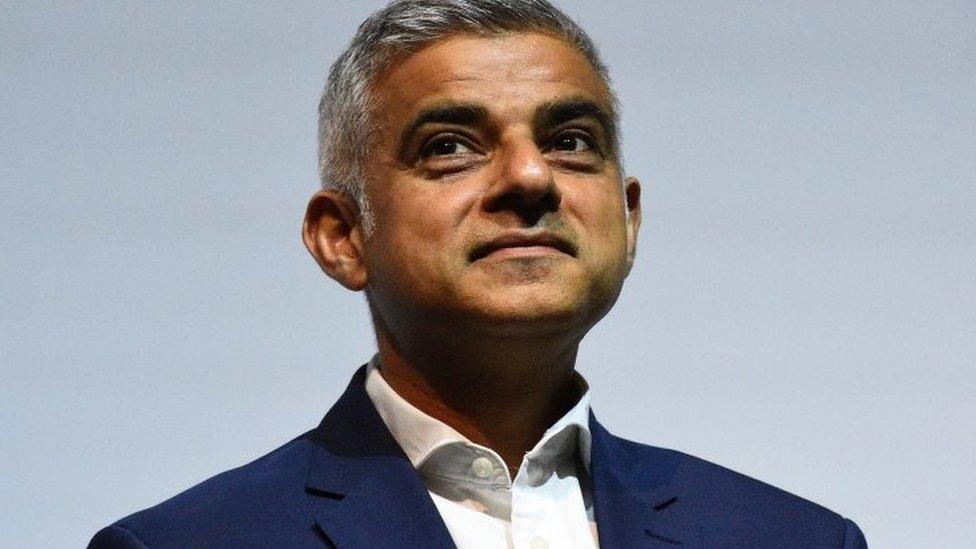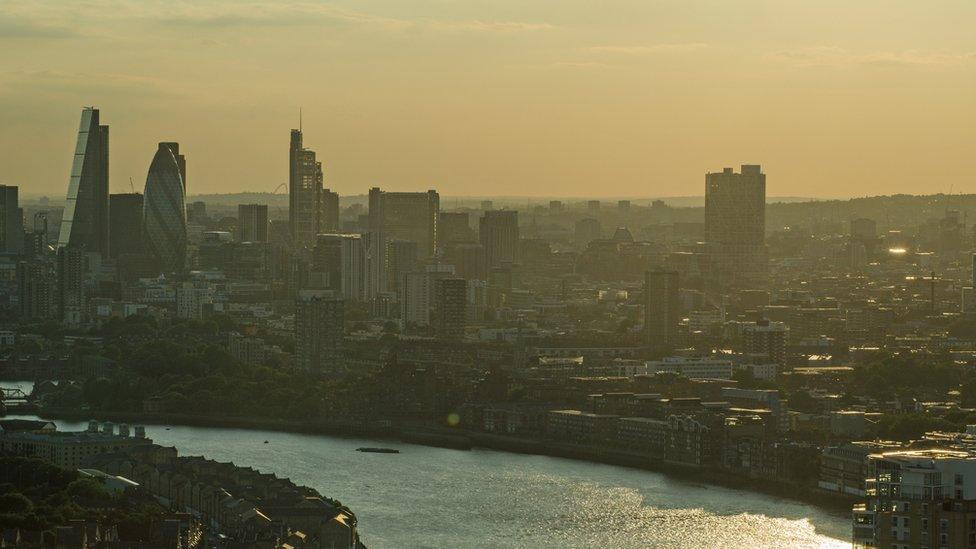Week ahead in Parliament
- Published
- comments

A quieter, but not rebellion free, week awaits the denizens of Westminster, as MPs take a break from Brexit battles, to vote on allowing an extra runway at London's Heathrow Airport instead.
I had wondered if, fresh from their triumph this week, the Conservatives whips would seize the moment and bring forward the long-postponed report stage consideration of the Trade Bill, where the Conservative Anna Soubry has been poised to push an amendment to require the government to seek "A" customs union with the EU.
They have not, and after their disarray over the Grieve "meaningful vote" amendment this week, this may give the self-styled "economic realists" on the Conservative benches a bit of breathing space, and the chance for a restorative group hug.
Meanwhile, alongside a humdrum legislative agenda (Heathrow excepted) keep an eye on the increasingly assertive activities of the select committee chairs - where they are pushing detailed policy agendas on air quality and social care, and pressing for more power to veto key quangocrat appointments and check the commercial activities of former ministers (I can't think who they have in mind....)
Next week also sees Mr Speaker Bercow proceed beyond his self-imposed sell-by date of nine years in the Chair of the Commons; his old-firm antagonists, James Duddridge and Andrew Bridgen, are gathering signatures for an early day motion urging him to depart - but have the previous week's events given him a new lease of life?
The possibility that the Speaker might get to choose whether a government motion in the event of no final Brexit deal is amendable could provide him with an irresistible temptation to stay put, and might also provide the Opposition with a good reason to ensure he remains. Will this undercurrent surface next week?
Meanwhile, almost unnoticed, this week, the Digital, Culture, Media and Sport Committee Chair Damian Collins, put down a report that Dominic Cummings had failed to comply with the Order of the House of 7 June 2018, summoning him to give evidence to the committee.
At some point this will result in a motion to refer the matter to the Commons Privileges Committee for further action, which could mean another Commons debate. Watch this space.
Here's my rundown of the week ahead...
Monday 25 June
The Commons opens (2.30 pm) with Education questions, after which the usual crop of post-weekend urgent questions or ministerial statements may follow.
Then comes what promises to be the week's biggest vote, the vote to approve the National Planning Policy Statement for Airports, external.
The centrepiece of the NPS is expansion of London's Heathrow Airport, in the form of a third runway - an issue which this week prompted the resignation of Trade Minister Greg Hands from the government.
He is one of a number of Conservative MPs with seats in or around west London, who have severe constituency problems about Heathrow - notably Boris Johnson. (Your correspondent was the BBC's reporter at his general election count, in 2015, when the future foreign secretary celebrated his return to Parliament by promising to lie down beside his constituency neighbour, John McDonnell in front of the bulldozers; now, it seems he will be abroad when the vote is held.)
This is a decision where massive economic implications are weighed against the extra noise, congestion and pollution that will result. The government is committed to expanding airport capacity, arguing it will be crucial in securing the future of global Britain, and while the whips will probably be understanding about the constituency pressures faced by backbenchers, members of the government will be expected to toe the line, however close the flightpath their seats may be.
Labour's decision to allow its MPs a free vote on Heathrow expansion - which gets shadow chancellor Mr McDonnell off a similar hook - makes the vote a little bit more interesting, but the chances are that even after some Conservatives rebel, and some Labour and Lib Dem MPs join them, and maybe the SNP doesn't whip in favour, there will still be a big Commons majority for the NPS.
One key point here is that Heathrow is home to the biggest workplace branch of the super-union Unite, which is enthusiastically in favour of expansion.
Unite is a huge player in Labour politics, and its stance will weigh heavily with many Labour MPs, who will be getting a letter from the Unite boss, Len McCluskey urging them to support expansion. But, of course, this is just another chapter in a continuing saga. Once Parliament has spoken, the action will move to the courts, where a judicial review and other legal challenges look pretty certain.
The day ends with an adjournment debate led by the Conservative ex-army officer Leo Docherty on a 'Statute of limitations to protect veterans and soldiers' - this is part of a continuing parliamentary campaign which has serious support across parties and in particular on the Conservative backbenches - and which will also see the presentation of petitions to Parliament.
In Westminster Hall (4.30pm), MPs will debate e-petition 207040, external, calling on the government to "allow Premier League and Championship football clubs to introduce safe standing". The petition argues that it offers a much safer alternative to fans who wish to stand, rather than sit at football matches.
After the highly successful introduction to rail seating at Celtic Park, as well as numerous Bundesliga, external clubs, many football fans feel that laws preventing standing areas should be relaxed. The petition attracted 112,026 signatures."

An artist's impression of the lagoon across Swansea Bay
My committee picks are the Business, Energy and Industrial Strategy hearing (4.30 pm) with the Energy Minister, Claire Perry, on the Swansea Bay Tidal Lagoon plan. If built it would be the world's first tidal lagoon power plant, it was included in the UK government's 2014 National Infrastructure Plan, but there have been repeated reports that the government intends to drop it.
Rather topical at the moment is the hearing (4.45pm) of the special committee set up to examine the Draft Health Service Safety Investigations Bill - which would establish the Health Service Safety Investigations Body (HSSIB).
It is due to hear from the Health Minister, Caroline Dineage, and Keith Conradi, the Chief Investigator, of the Healthcare Safety Investigation Branch. The key questions the committee will pursue include whether the HSSIB can win the confidence of patients and their families as well as of healthcare professionals? Should its remit extend to private healthcare? And can patients and the public be confident that 'safe space' investigations will remedy the deficiencies of existing NHS complaints mechanisms?
And with experts warning that a major cyber attack on the UK is a matter of "when, not if", the Joint Committee on the National Security Strategy inquiry into the cyber security of critical national infrastructure hears from the Cabinet Minister David Lidington MP, on how it can be defended against cyber threats (4.15 pm).
In the Lords (2.30pm) the first business is the introduction to the House of the former Conservative Party Chairman and Communities Secretary, Eric Pickles.
After the usual half hour of questions, peers will rattle through a series of debates on new orders and regulations on subjects varying from nursing and midwifery; to digital government disclosure of information regulations, before turning to a debate on automatic workplace pension enrolment.
Tuesday 26 June
The Commons opens (11.30am) with Foreign Office questions, followed by a Ten Minute Rule Bill from the Conservative Kirstene Hair on protecting children from being targeted by advertising for unhealthy food - she argues there is evidence to show that children's exposure to food advertisements can have a major influence their diet and therefore their weight, so cutting their exposure to advertisements for unhealthy food is a vital tool in the fight against childhood obesity.
After that, it's the kind of scrappy Commons day that leaves room for short-notice statements or urgent questions - MPs debate a statutory instrument on the Draft European Union (Definition of Treaties) (Canada Trade Agreement) Order, external and European documents relating to EU Trade Agreements: EU-Japan Economic Partnership Agreement, external, and consideration of Lords amendments to the Automated and Electric Vehicles Bill., external
There isn't much controversy to be had here; the amendments cover issues like insurance for automated vehicles, and providing refuelling points in all new residential and commercial developments.
Then MPs polish off consideration of another relatively uncontroversial measure - the Haulage Permits and Trailer Registration Bill, external, which provides for a post Brexit lorry licensing system, if not deal with the EU is reached.
In Westminster Hall, debates include access to treatment, support and innovative new medicines for Phenylketonuria, external patients (9.30am) - this is led by Labour MP Liz Twist, who chairs the all-party group on this serious protein deficiency disease; Labour MP Ian Lucas leads a debate (11am) on the North Wales police, probation and the murder of Nicholas Churton - focusing on the decision that his killer could be safely released; the Humanitarian situation in Gaza (2.30pm); sentences for supplying the opioid drug Fentanyl (4pm) and the future of upland farming after the UK leaves the EU (4.30 pm).

On the committee corridor, highlights include the Mayor of London, Sadiq Khan, appearing before the Public Administration and Constitutional Affairs hearing on devolution and exiting the EU (9.45am) and another everyday issue-focussed Environmental Audit inquiry into hand car washes begins (10.15am).
The Defence Committee quiz the veterans minister Tobias Ellwood, on armed forces and veterans' mental health (11.30am) along with the Surgeon General at the Ministry of Defence, and the Mental Health Minister, Jackie Doyle-Price.
In the Lords (2.30pm) two more new peers arrive - the Conservative, former cabinet minister Lord [Peter] Lilley and the former DUP MP Lord McCrea of Magherafelt and Cookstown. After questions, there are debates on the forthcoming NATO Summit and the report from the International Relations Committee The NATO Summit 2018, external.
Wednesday 27 June
MPs kick off (11.30am) with half an hour of questions to David Lidington in his guise as the Chancellor of the Duchy of Lancaster and the minister for the Cabinet Office, before the next exciting episode of Prime Minister's Questions at noon (watch out for my minute-by-minute analysis on the Westminster Live page).

There's a ten minute rule motion from Labour's Paula Sherriff to require some public buildings to have toilets which meet the needs of people with disabilities and accessibility requirements.
The main debate is on the second reading of the Offensive Weapons Bill, external, which will ban the delivery of knives and corrosives bought online, to residential addresses.
In Westminster Hall the opening debate (9.30am) is on the provision of healthcare on English islands - it is lead by the Isle of Wight MP, the Conservative, Bob Seely, and marks the debut of a new All Party Group on islands.
The issue at hand is that island communities often need facilities that would normally have to have a much larger catchment population behind them - so the cost per patient of their hospitals and other NHS facilities is often much higher, and sometimes comes at the expense of other NHS services, which would normally be provided on mainland areas. Other debates include the removal of shooting sports from Birmingham 2022 Commonwealth Games (11am); the future of the Scottish economy (2.30pm); BAME blood, stem cell and organ donation (4pm) and protection of British flora from imported diseases (4.30pm).
My picks from the day's action on the committee corridor are the Environment, Food and Rural Affairs hearing on dangerous dogs: breed specific legislation. They will be asking how effective the government's current approach is to protecting the public from dangerous dog attacks. Witnesses include the National Police Chiefs Council, the National Companion Animal Forum, and the Communication Workers Union, and NFU (9.30am).
The Education Committee meets the Education Secretary Damian Hinds (10am) and the likely topics include skills and apprenticeships, school accountability, teacher retention and recruitment.
Following last week's highly critical National Audit Office report on Universal Credit and the claims for its benefits, Frank Field's Work and Pensions Committee will question DWP Minister Alok Sharma (9.30am).
In the Lords (3pm) peers debate the third reading of the Civil Liability Bill, external (this is normally a fairly rapid rubber-stamping exercise) before turning to the report stage consideration of the Domestic Gas and Electricity (Tariff Cap) Bill, external.
Thursday 28 June
The Commons opens (9.30 am) with International Trade questions, followed at 10am by Women and Equalities questions, and then by the weekly Commons Business Statement from the Leader of the House, Andrea Leadsom.

The rest of the day looks like an extended exercise in select committee muscle-flexing: first there's a statement from the chairs of the Health and Social Care Committee and the Housing, Communities and Local Government Committee on their new joint report into the long-term funding of adult social care - an attempt to tackle one of the most difficult policy issues in this area; they have specific policy proposals that they are hoping the government will pick up, and they will be pushing the case further in a forthcoming Estimates Day debate.
Then comes another debate on a joint select committee report, this time on Improving Air Quality, external, with the Environmental Audit and Environment Food and Rural Affairs, Transport and Health Committees, which calls for "national leadership and consensus-building to bring about a step change in how the problem of air quality is tackled..." and warns "the government cannot continue to put public health at risk".
Then the barrage continues with a debate on "the role and effectiveness of the Advisory Committee on business appointments" led by the Public Administration chair, Sir Bernard Jenkin. It might not be a total surprise if the name of the former Chancellor George Osborne was uttered in the course of this debate.
In Westminster Hall, there's an interesting-looking debate on Russian Federation activity in the UK and globally led by the Conservative, Bob Seely, who is rapidly emerging as one of the foreign policy wonks of the 2017 intake.
He will argue that the Russian leadership, under President Putin, is engaging in a new cold war, fought by 21st Century methods as well as by more traditional methods of spying and subversion, and that MPs and ministers need to better understand the threat and devise effective means of response.
There's a rare Thursday sitting of select committee, when the Public Administration and Constitutional Affairs Committee (PACAC for short) has the unusual experience of taking evidence from the chairs of two other committees (9.45am). Nicky Morgan, Chair of the Treasury Committee, and Damien Collins, Chair of the Digital, Culture, Media and Sport Committee will be quizzed about about the role of Parliamentary committees in scrutinising important public appointments - inspectors, industry regulators and the like.
Their "pre-appointment" hearings carry nothing like the clout of the confirmation hearings held by the US Congress - and the government has sometimes ignored recommendations against candidates for key quango posts. Nicky Morgan's 2016 decision to press ahead, after the Education Committee said it would not back Amanda Spielman as the next chief inspector of schools should add a bit of spice to proceedings.
In the Lords (11am), there is a debate on the role and responsibilities of Police and Crime Commissioners led by the Crossbencher and former Cabinet secretary, Lord Armstrong of Ilminster, who was one of those who sprang to the defence of the late Sir Edward Heath, when child abuse allegations were made against him.
Next comes a debate on the challenges facing disabled people in the UK in 2018 - led by the Lib Dem, Baroness Thomas of Winchester, and there will also be a short debate on continuing violence between communities and armed groups in Nigeria - led by Lord Alton of Liverpool.
Friday 29 June
The Commons is not sitting, but in the Lords, peers will be debating private members' bills (from 11am), starting with the detail of the Registration of Marriage Bill, external, which is proposed by the Bishop of St Albans.
This is the bill that would enable a mother's name to appear as standard on marriage certificates, changing the current set up where only the father's name is required to be listed. There is a parallel bill before the Commons, proposed by the Conservative, Caroline Spelman, who is a Church Commissioner. This is making slower progress.
Then peers turn to two private members' bills send over from the Commons. First, the Assaults on Emergency Workers (Offences) Bill, external - which makes attacks on them an aggravated offence, which can lead to a tougher punishment.
Then the Parental Bereavement (Leave and Pay) Bill, external - which deals with leave and pay for employees whose children have died.